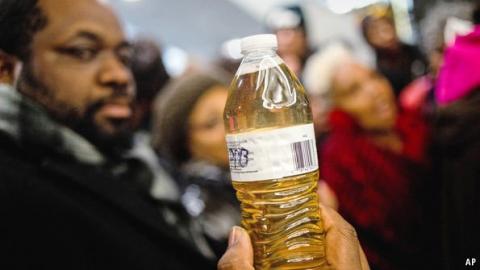
A note from the National Women's Law Center: This post previously appeared on NWLC's blog. We thought it was appropriate for this blog carnival since, as the post mentions, the Flint water crisis is an issue that disproportionately impacts poor women of color, particularly black women, and thus is a feminist issue with intersecting implications for racial, economic, reproductive, and environmental justice.
It’s a devastating irony that in the Great Lakes State, surrounded by fresh water, the people of Flint, Michigan can’t turn on the tap.
With each new story of the Flint water crisis—the poisoning of thousands of people through the city’s water supply in the name of cost savings—comes an added dimension of complexity, tragedy, and outrage. Children with levels of lead in their blood that are so high that the mayor declared a state of emergency. Long lines of people trying to get lead testing kits, bottled water, and filters. Animals suffering from lead poisoning after drinking tap water. A spike in the rates of Legionnaire’s disease, resulting in at least 10 deaths.
This issue hits particularly close to home for me, not only because Michigan is my home state but because for many decades, Flint was my family’s home. Both of my parents grew up in blue-collar Flint families; my grandfather and uncles worked the line at a General Motors plant before the auto industry left the city, contributing to Flint’s status as the second-most poverty stricken city of its size in the nation.
The Flint water crisis is a feminist issue, one with intersecting implications for economic, racial, environmental, immigrant, and reproductive justice. Here’s what some of the numbers tell us:
- 42: Percentage of Flint residents who live below the poverty line—and data shows that women of color, single mothers and elderly women living alone are disproportionately poor. For families who are already struggling to make ends meet, buying large supplies of bottled water or expensive water filters is just not an option. The Flint water crisis is an economic justice issue.
- 57: Percentage of Flint residents who are black. Recently, the Black Lives Matter National Network released a statement in solidarity with the people of Flint, citing water as a human right that has been denied to black people in Flint as well as in cities like Detroit. The Flint water crisis is a racial justice issue.
- 13,200: Parts per billion lead concentration found in Flint water supply. There is “no safe level” for lead in water, but the EPA classifies water as “toxic waste” at 5,000 parts per billion. The Flint water crisis is an environmental justice issue.
- 1,000: Estimated community of undocumented immigrants living in Flint. Many undocumented families have stayed away from water distribution centers for fear of deportation—and others who have been turned away from water filter distribution centers because of their immigration status. And because the information about the hazards of drinking the water was only in English, organizers have been going door to door to let non-English speakers know not to drink it. The Flint water crisis is an immigrant justice issue.
- 9,000-10,000: The estimated number of children who have been exposed to lead poisoned water. According to the World Health Organization, “lead has had serious consequences for the health of children,” including behavioral changes, impact on IQ and educational attainment, and for those with high levels of exposure, “coma, convulsions, and even death”. Thousands more pregnant women have been exposed to the water, which can lead to higher rates of miscarriage and other health risks for a pregnancy. The Flint water crisis is a reproductive health issue.
An intersectional feminist movement is one that shines a light on the complexities of how issues interact and impact marginalized people. Low-income women of color, as well as undocumented immigrants, and their families are the ones who are hardest hit by this crisis. Its effects will have long lasting and, for many, irreversible impacts on the health and lives of the people of Flint.
For all of these reasons and more, the Flint water crisis is undeniably a feminist issue. Women have already been at the forefront of bringing attention to this crisis. Those of us who count ourselves as part of a movement to end intersecting systems of oppression must stand in solidarity with the people of Flint in their call for justice.
Learn more about how you can help Flint residents impacted by the water crisis
Find out how you can support undocumented communities in Flint.



The views and opinions expressed in this post are those of the author(s) and do not necessarily reflect those of MomsRising.org.
MomsRising.org strongly encourages our readers to post comments in response to blog posts. We value diversity of opinions and perspectives. Our goals for this space are to be educational, thought-provoking, and respectful. So we actively moderate comments and we reserve the right to edit or remove comments that undermine these goals. Thanks!